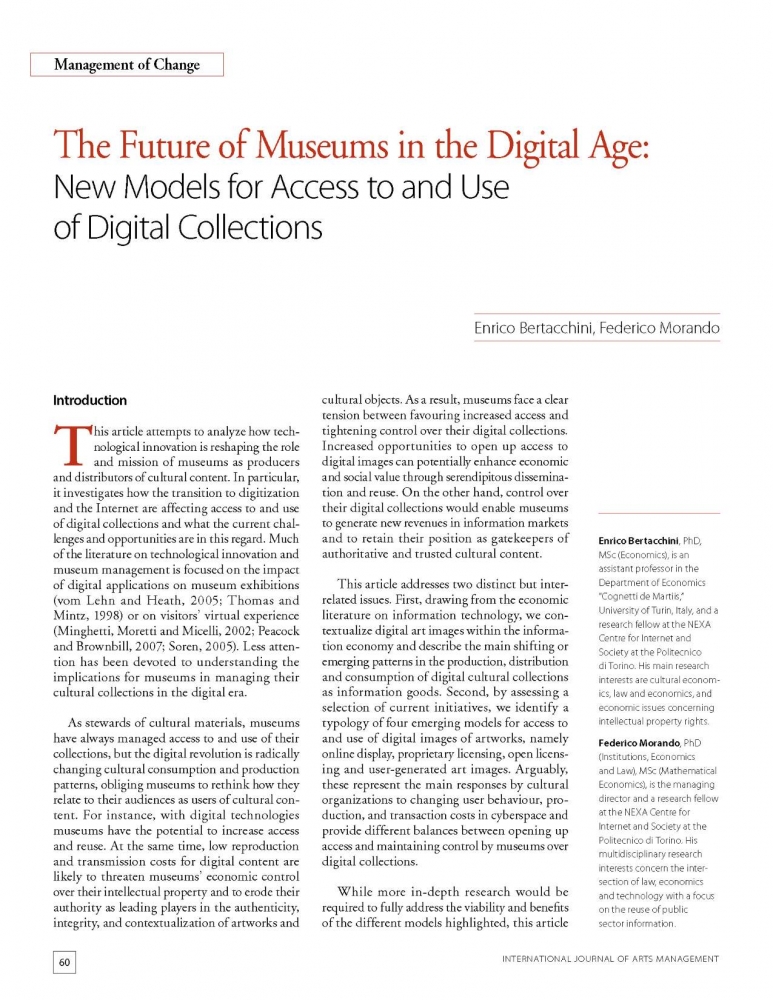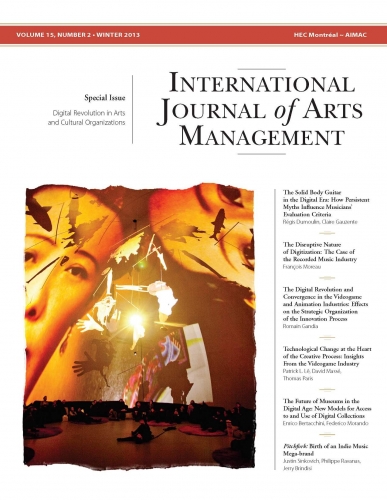The Future of Museums in the Digital Age: New Models for Access to and Use of Digital Collections
Produit: Article
21,00 $ CA
Enrico Bertacchini, Federico Morando
Enrico Bertacchini, PhD, MSc (Economics), is an assistant professor in the Department of Economics “Cognetti de Martiis,” University of Turin, Italy, and a research fellow at the NEXA Centre for Internet and Society at the Politecnico di Torino. His main research interests are cultural economics, law and economics, and economic issues concerning intellectual property rights.
Federico Morando, PhD (Institutions, Economics and Law), MSc (Mathematical Economics), is the managing director and a research fellow at the NEXA Centre for Internet and Society at the Politecnico di Torino. His multidisciplinary research interests concern the intersection of law, economics and technology with a focus on the reuse of public sector information.
ABSTRACT
The authors investigate how the transition to digitization and the Internet is affecting the management of museums’ digital collections and the challenges and opportunities it presents. Drawing from the economic literature on information technology and from a selection of current initiatives in cyberspace, they provide an analytical framework for identifying the emerging models regarding access to and use of digital collections and for evaluating the challenges to museums in their role as providers of authoritative content, the profitability of digital collections, and the adoption of new metrics to assess the social impact and public mission of digital collections.
KEYWORDS
Digital collections, museums, information economy, Internet
RÉSUMÉ
Les auteurs étudient comment la transition à la numérisation et à internet influe sur la gestion des collections numérisées des musées, ainsi que les défis et les possibilités qu’elle offre. s’inspirant de la littérature sur l’économie de l’information et d’un éventail d’initiatives virtuelles en cours, ils présentent un cadre analytique pour cerner les modèles émergents d’accès à des collections numérisées et de leur utilisation, et pour évaluer non seulement les défis qui se posent aux musées dans leur rôle de fournisseurs de contenu digne de foi, mais aussi la rentabilité des collections numérisées et la possibilité d’adopter de nouveaux paramètres pour déterminer l’impact social et la mission publique de telles collections.
MOTS CLÉS
Collections numérisées, musées, économie de l’information, internet
RESUMEN
Los autores estudian de qué manera la transición hacia la digitalización y la internet influye la gestión de las colecciones digitalizadas de los museos, además de los desafíos y posibilidades que resultan de tal transición. Inspirados por las publicaciones en el ámbito de la economía de la información y de una gama de iniciativas virtuales en marcha, los autores presentan un marco analítico que permite identificar los modelos emergentes de acceso y utilización de las colecciones digitalizadas. Este marco puede utilizarse asimismo para evaluar no solo los desafíos que enfrentan los museos como parte de su papel de proveedores de contenido fiable, sino también la rentabilidad de las colecciones digitalizadas y la posibilidad de adoptar nuevos parámetros para determinar el impacto social y la misión pública de estas colecciones.
PALABRAS CLAVE
Colecciones digitalizadas, museos, economía de la información, internet

